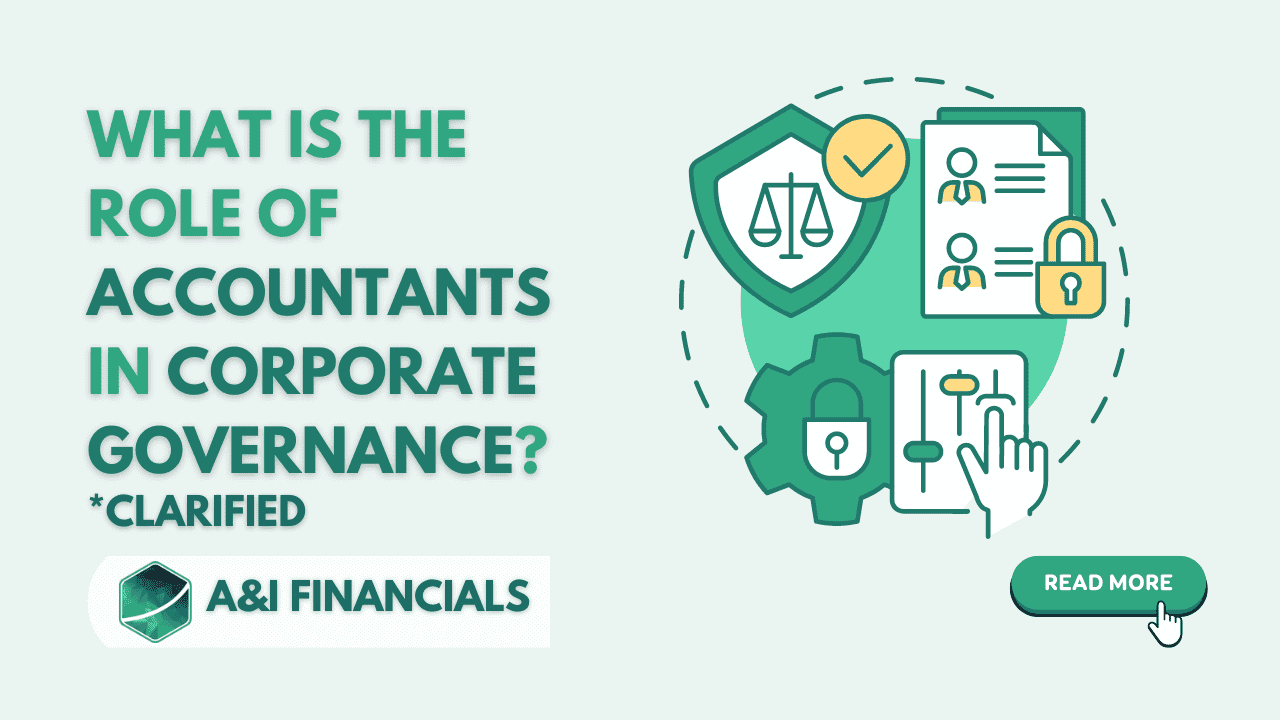What is the Role of Accountants in Corporate Governance?
Corporate governance is like the backbone of any company. It’s what keeps everything in place, ensuring that businesses run smoothly, ethically, and in line with the law. But when we dive deeper, we find that accountants are the unsung heroes in this entire framework. Without them, corporate governance would be like a ship lost at sea. So, what is the role of accountants in corporate governance? Simply put, they are the guardians of financial integrity, ensuring that every penny is accounted for and that every decision is backed by solid data.
Understanding Corporate Governance
Before we dive into the role of accountants, let’s quickly brush up on what corporate governance is all about. Corporate governance refers to the system of rules, practices, and processes by which a company is directed and controlled. It involves balancing the interests of a company’s many stakeholders, such as shareholders, management, customers, suppliers, financiers, government, and the community.
Good corporate governance is essential for building trust with stakeholders, ensuring transparency, and maintaining the company’s reputation. It also involves setting the framework within which a company’s objectives are set and pursued. So, where do accountants fit into this picture?
The Role of Accountants in Corporate Governance
Accountants play a major role in corporate governance. They are the financial gatekeepers, ensuring that all financial activities are conducted according to established rules and regulations. Their role goes beyond just number-crunching; they are pivotal in shaping the company’s strategy, monitoring its performance, and ensuring that it operates in a transparent and accountable manner.
Ensuring Compliance with Accounting Standards
One of the primary roles of accountants is to ensure that a company complies with accounting standards, such as the International Financial Reporting Standards (IFRS). These standards provide a common global language for business affairs so that company accounts are understandable and comparable across international boundaries.
By adhering to these standards, accountants help maintain the integrity of financial statements, which is crucial for both internal and external stakeholders.
Providing Detailed Financial Information
Accountants are responsible for preparing detailed financial information that is used by the board of directors to make informed decisions. This information includes financial statements, budgets, forecasts, and other reports that provide insights into the company’s financial health. Without accurate and timely financial information, the board would be flying blind, unable to make sound investment decisions or steer the company in the right direction.
Supporting the Board of Directors
The board of directors relies heavily on accountants for accurate financial reporting. Accountants provide the data that the board needs to make decisions that align with the company’s strategic goals. For example, when the board is considering a new investment, accountants provide detailed financial analysis that highlights the potential risks and rewards. This helps the board make informed decisions that support the long-term success of the company.
Implementing and Monitoring Internal Controls
Internal controls are processes and procedures that ensure the integrity of financial and accounting information, promote accountability, and prevent fraud. Accountants play a critical role in designing, implementing, and monitoring these controls. They ensure that all financial transactions are recorded accurately, that assets are safeguarded, and that the company’s financial records are reliable.
Enhancing Corporate Disclosure
Corporate disclosure refers to the process of making a company’s financial and operational information available to stakeholders. Accountants ensure that this information is accurate, complete, and disclosed in a timely manner.
This transparency builds trust with stakeholders and helps the company maintain its reputation. Moreover, it ensures that the company complies with regulations like the Sarbanes-Oxley Act, which mandates that companies disclose their financial information to protect investors.
Mitigating Financial Risks
Accountants are also responsible for identifying and mitigating financial risks. They analyze the company’s financial data to identify potential risks and develop strategies to manage them. For example, they might identify risks related to currency fluctuations, changes in interest rates, or potential financial fraud. By managing these risks, accountants help protect the company’s financial stability.
Advising on Investment Decisions
Investment decisions are some of the most critical decisions a company can make. Accountants provide the financial analysis that underpins these decisions, helping the company assess the potential return on investment and the associated risks. Whether it’s a short-term investment in new technology or a long-term investment in a new market, accountants play a key role in ensuring that these decisions are financially sound.
Facilitating Corporate Governance
In essence, accountants are the facilitators of corporate governance. They provide the financial information and analysis that enable the board of directors to fulfill their governance responsibilities. They ensure that the company complies with financial regulations and that it operates transparently and ethically. In doing so, they help build trust with stakeholders and contribute to the company’s long-term success.
Real-Life Example: The Role of Accountants in the Sarbanes-Oxley Act
The Sarbanes-Oxley Act (SOX) is a perfect example of how accountants play a crucial role in corporate governance. SOX was enacted in response to financial scandals like Enron and WorldCom, where companies were found to have engaged in massive accounting fraud. The act requires companies to implement strict internal controls and to have their financial statements audited by independent auditors.
Accountants are at the forefront of ensuring compliance with SOX. They design and implement internal controls, prepare financial statements, and work with auditors to ensure that these statements are accurate and comply with the law. Without the involvement of accountants, it would be impossible for companies to meet the requirements of SOX and to rebuild trust with investors.
The Importance of Accountants in Corporate Governance
Now that we’ve explored the various roles accountants play in corporate governance, it’s clear that they are indispensable to the process. Their work ensures that companies operate transparently, ethically, and in compliance with the law. They provide the financial information and analysis that board members need to make informed decisions. They design and monitor internal controls that protect the company’s assets and ensure the integrity of its financial records.
Building Trust with Stakeholders
One of the most important roles of accountants in corporate governance is building trust with stakeholders. By providing accurate and timely financial information, accountants help build trust with shareholders, customers, suppliers, and other stakeholders. This trust is essential for maintaining the company’s reputation and ensuring its long-term success.
Ensuring Financial Integrity
Financial integrity is at the heart of corporate governance, and accountants are the guardians of this integrity. They ensure that all financial transactions are recorded accurately and that financial statements provide a true and fair view of the company’s financial position. This integrity is crucial for maintaining the trust of stakeholders and for ensuring that the company operates in a transparent and accountable manner.
Supporting Ethical Decision-Making
Ethical decision-making is another key aspect of corporate governance, and accountants play a crucial role in this area. They provide the financial information and analysis that enables the board of directors to make decisions that are not only financially sound but also ethically responsible. By doing so, accountants help ensure that the company operates in a way that is consistent with its values and that it maintains its reputation as an ethical and responsible business.
Ensuring Compliance with Regulations
Compliance with regulations is a fundamental aspect of corporate governance, and accountants are responsible for ensuring that the company meets its regulatory obligations. Whether it’s complying with accounting standards, adhering to tax laws, or meeting the requirements of the Sarbanes-Oxley Act, accountants ensure that the company operates within the law and that it avoids costly penalties and legal issues.
Supporting Long-Term Success
Ultimately, the role of accountants in corporate governance is about supporting the long-term success of the company. By providing accurate financial information, ensuring compliance with regulations, managing financial risks, and supporting ethical decision-making, accountants help ensure that the company is well-positioned for long-term success.
Their work helps build trust with stakeholders, maintain the company’s reputation, and ensure that it operates in a transparent, accountable, and ethical manner.
Conclusion
So, what is the role of accountants in corporate governance? They are the backbone of financial integrity, ensuring that companies operate transparently, ethically, and in compliance with the law. From ensuring compliance with accounting standards to providing detailed financial information and supporting the board of directors, accountants play a crucial role in corporate governance. They build trust with stakeholders, support ethical decision-making, and ensure the company’s long-term success.
In a world where corporate governance is becoming increasingly important, the role of accountants has never been more critical. They are the unsung heroes who work behind the scenes to ensure that companies are financially sound, transparent, and accountable. Without them, corporate governance would be nothing more than a house of cards, ready to collapse at the first sign of trouble.
So next time you think about corporate governance, remember the accountants who work tirelessly to ensure that everything is in place, that every penny is accounted for, and that every decision is backed by solid financial data. They are the guardians of financial integrity, and their role in corporate governance is nothing short of essential.







